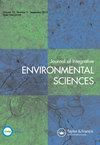将城市绿地生态系统服务与改善微气候的规划和设计工具联系起来的概念框架
IF 3.5
4区 环境科学与生态学
Q3 ENVIRONMENTAL SCIENCES
Journal of Integrative Environmental Sciences
Pub Date : 2016-07-01
DOI:10.1080/1943815X.2016.1201516
引用次数: 2
摘要
通过土地管理,城市规划和设计过程是显著影响城市绿地分布的重要因素,从而影响生态系统服务的提供,从而为地方层面的气候适应过程管理提供机会。然而,与其他规划类别相比,对ugl的规划往往是次要的,而且它们往往没有得到充分利用。通过对塞尔维亚和保加利亚主要城市中心总体规划的分析,本文讨论了UGLs的概念化以及在规划和设计过程中ESs的整合。基于层次分析法(analytic Hierarchy Process)的研究结果,本文提出了一个概念框架,将ESs与城市规划过程中不同类型的UGL联系起来,以便更好地将UGL应用于城市微气候条件改善策略中。本文提出了在规划设计过程中对UGL进行生态敏感概念化的框架,其中UGL类型应取代功能类别,并定义与UGL类型相关的空间指标。这种方法可以提高对UGLs在规划过程和地方适应策略中的理解和es敏感应用。本文章由计算机程序翻译,如有差异,请以英文原文为准。
A conceptual framework for linking urban green lands ecosystem services with planning and design tools for amelioration of micro-climate
Abstract Urban plannings and design processes, through land management, are important factors that significantly influence the distribution of urban green lands (UGLs), and thus, the provision of ecosystem services (ESs), thereby providing opportunities for managing climate adaptation processes at the local level. However, planning for UGLs is often secondary to other planning categories, and they often remain underutilized. Through an analysis of Master Plans of major urban centres in Serbia and Bulgaria, this paper discusses the conceptualization of UGLs and the integration of ESs in planning and design processes. Based on findings obtained through an Analytical Hierarchy Process, this paper develops a conceptual framework for linking ESs with different UGL types in the course of urban planning, in order to achieve a better application of UGLs in strategies for the amelioration of micro-climatic conditions in urban areas. This paper proposes framework for an ecosystem sensitive conceptualization of UGLs in planning and design process, where UGL typology should replace functional categories, and spatial indicators are defined in relation to UGL types. Such an approach can improve the understanding and ES-sensitive application of UGLs in planning processes and local adaptation strategies.
求助全文
通过发布文献求助,成功后即可免费获取论文全文。
去求助
来源期刊

Journal of Integrative Environmental Sciences
ENVIRONMENTAL SCIENCES-
CiteScore
3.90
自引率
0.00%
发文量
13
审稿时长
>12 weeks
期刊介绍:
Journal of Integrative Environmental Sciences (JIES) provides a stimulating, informative and critical forum for intellectual debate on significant environmental issues. It brings together perspectives from a wide range of disciplines and methodologies in both the social and natural sciences in an effort to develop integrative knowledge about the processes responsible for environmental change. The Journal is especially concerned with the relationships between science, society and policy and one of its key aims is to advance understanding of the theory and practice of sustainable development.
 求助内容:
求助内容: 应助结果提醒方式:
应助结果提醒方式:


